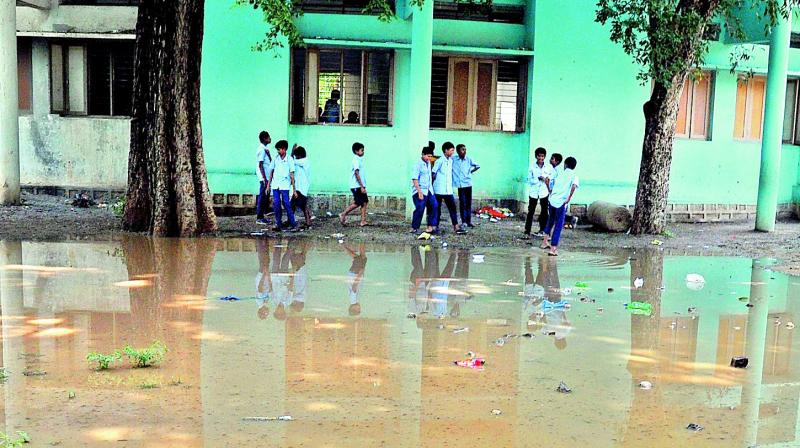Hyderabad drops flood bypass project
The experts estimated that commuters spent an excess of Rs 9 crore a day on fuel spent on poor roads.

Hyderabad: The urban flooding bypass project, recommended by Jawarharlal Nehru Technological University, Hyderabad (JNTUH) experts to save commuters about Rs 3,000 crore per annum, is in cold storage. It is likely to be shelved as the financially-strapped government cannot affort its cost of Rs 4,993 crore.
GHMC officials said the shelving of a proper storm water network would res-ult in inundation and severe road damage throughout the year due to the unseasonal rain (apart from the monsoon). The experts estimated that commuters spent an excess of Rs 9 crore a day on fuel spent on poor roads; this is apart from the annual property tax, and expenses on vehicle maintenance.
The experts felt that conventional ways of laying city roads led to severe road damage in moderate rainfall, and suggested that instead of spending Rs 1,000 crore on regular road maintenance, the civic body could strengthen the storm water netwo-rk, construct rainwater harvesting pits, and effect minor changes in road de-sign to relieve commuters from traffic jams, water-logging, and flooding.
The recommendations were submitted for appro-val in February, but the civic body did not respond. The Municipal Administration and Urban Development dropped hints not to go ahead.
A study headed by Mr K.M. Lakshmana Rao, head of civil engineering, JNTU, said the road network was affected by rainwater flow. Riding quality has gradually fallen due to potholes not just during monsoons but during also unseasonal rain in April-May and October-Novem-ber. This affected vehicular speed, road functionality, reduced traffic capacity, enhanced travel and health risk.
City spends Rs 9 crore+ a day on fuel
Pollution levels have also increased alarmingly as 30 lakh vehicles hit the road daily and face bumper to bumper traffic during peak hours.
The report says that if the cost of travelling 1.5 kms is Rs 6 on average and taking all vehicle composition into account, commuters spend Rs 9 crore in excess fuel charges a day. “Over three months it comes to Rs 810 crore, and over a year, if one assumes 300 days of peak interaction it costs Rs 2,700 crore. Other impact like physical strain and travel time value makes it higher than Rs 3,000 crore per annum”, Rao said.
He recommended that the permanent solution involved not rocket science but simple methods. City roads could be improved by a geo-metric facelift, constructing rainwater harvesting pits in individual households at identified locations in order prevent rainwater from entering the roads, constructing water tanks near any stagnation and pumping water through gravity. This could be achieved at 20 per cent of the fuel cost wasted during traffic congestion in a phased manner.
A senior GHMC official demanding anonymity said the state government will not execute any new project, citing the financial crunch. Asked about alternate mechanism he said nothing will be possible without financial support. Commuters will have to bear the brunt.

